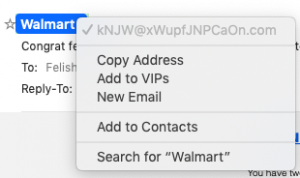Have you ever received an email saying you won some money?
If so, you might have received a scam message.
What is a scam message?
In a scam message, someone asks you for personal information, like your name, credit card number, passwords, or address. They use that information to take money from your bank accounts or put false charges on your credit cards.
There are many types of scam messages
Scammers try many different ways to get personal information.
They might tell you that you have won a lot of money, or a prize. Then, they ask you to confirm your credit card information to get the prize.
They might tell you that there is a mistake on your phone or internet bill. They tell you that you must log in to your online accounts to see the mistake.
They might send you a text or email saying you have a special delivery in the mail. You might be asked for your name and address. Or, you could be asked to send them some money so they can deliver your package.

This is a scam message. It is asking you to confirm your address.
How to protect yourself
Protecting yourself from scams isn’t hard. Here are some ideas:
- Have strong passwords. Make sure your passwords have numbers, letters, and special characters, like ! or &. Don’t use your birthday or the names of people you know as a password.
- Don’t send emails with personal information. Call instead.
- Check who is sending you emails. If a company emails you, check the sending address. If it does not match the company’s name, it might be a scam message.
- Know when something seems too good to be true. If a stranger offers you money over email, don’t accept it. If you win a vacation over email, check who the sender is.

This message looks like it is from Walmart, but it’s a scam.
Submitted/Photos by Felisha Chuter